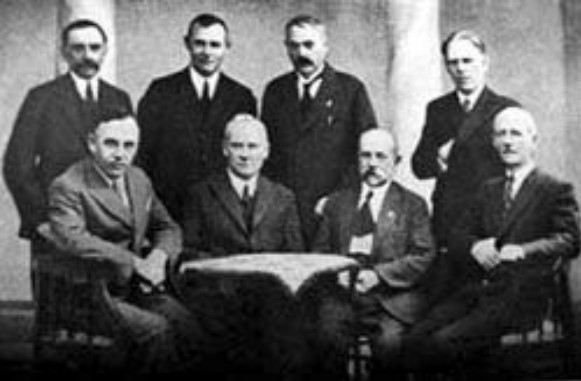Ukrainian Husbandry Academy
Ukrainian Husbandry Academy [Українська господарська академія; Ukrainska hospodarska akademiia, or УГАК; UHAK). A postsecondary school operating in Poděbrady, Czechoslovakia, from 1922 to 1935. It was founded by the Ukrainian Civic Committee in Czechoslovakia, which was headed at the time by Mykyta Shapoval, and was financed by the Ministry of Foreign Affairs of the Czechoslovak Republic. The school’s first constitution, which was approved by the Czechoslovak Ministry of Agriculture on 16 May 1922, defined an institution similar to Czechoslovak schools of higher learning. The UHAK consisted of three faculties subdivided into departments: (1) the faculty of agronomy and forestry, (2) the faculty of engineering, with departments of chemical-technology and hydrotechnology, and (3) the faculty of economics and co-operative studies, with departments of economics and statistics, and numerous co-operatives. Its supporting institutions included a library of 30,000 volumes, 33 special collections, 14 laboratories, several experimental farms, a tree farm, a meteorological station, and two training co-operatives. Most of these facilities were housed in the castle built by Jiři of Poděbrady (1420–71). The academy’s three-year program led to an engineering degree and differed from the standard program in Czechoslovak schools only in offering courses in Ukrainian studies. In 1925 the program of study was extended to four years. The academy’s program was overseen by the Ministry of Agriculture, its economic and administrative affairs by the Ministry of Foreign Affairs. The highest governing body of the UHAK was the Faculty Council and its presidium, consisting of the rector, prorector, and secretary of the council. The rectors were Ivan Shovheniv (1922–5, 1926–7), Borys Ivanytsky (1925–6, 1928–35), and Serhii Tymoshenko (1927–8).
In the first decade of its operation the school employed 118 teachers in total, 92 of whom were Ukrainians and 26 of whom were Czechs. At its peak (in 1928) the teaching staff numbered 96. Many of the faculty members were distinguished scientists, such as Viktor Domanytsky and Volodymyr Cherediiv (agronomists), Borys Ivanytsky (forester), Oleksander Mytsiuk, Valentyn Sadovsky, and Vladimir Timoshenko (economists), Serhii Borodaievsky and Borys Martos (co-operative organizers), Fedir Shcherbyna (statistician), Luka Bych and Otto Eikhelman (jurists), Olgerd Ippolit Bochkovsky (sociologist), and Serhii Komaretsky (chemist).
The total enrollment over the years was 786, with a peak of 613 students in 1926–7. The student population was for the most part made up of Ukrainian émigrés. Most of the students were dependent on the government for financial assistance. A total of 559 students graduated with engineering degrees—125 agronomists, 92 foresters, 58 chemical-technologists, 117 hydrotechnicians, and 167 economists. In the 1930s most of them worked in their professions in Western Ukraine.
The academy undertook a vigorous publishing program. It issued 698 scientific publications, including 229 books (of which many were the first technical higher education textbooks to appear in Ukrainian). The Terminological Commission worked to develop a consistent Ukrainian technical terminology; in particular it published a German-Ukrainian forestry dictionary. Some 50 organizations, including 9 scientific and professional associations, sprang up at the academy.
In 1928, as financial support for the UHAK diminished, the Czechoslovak government ordered the academy not to admit any more new students and gradually to wind down its operation. In 1931 the Society of Friends of the Ukrainian Husbandry Academy (president, Borys Matiushenko) was set up in Prague to save the academy. Enough funds could not be raised, and the academy closed in 1935. The society directed its efforts at the Ukrainian Technical and Husbandry Institute, which had been established as a correspondence school at the academy in 1932.
BIBLIOGRAPHY
Narizhnyi, S. Ukraïns’ka emigratsiia (Prague 1942)
Ukraïns’ka hospdars’ka akademiia v Ch.S.R., 1922–1935 (New York 1959)
[This article originally appeared in the Encyclopedia of Ukraine, vol. 5 (1993).]
.jpg)

